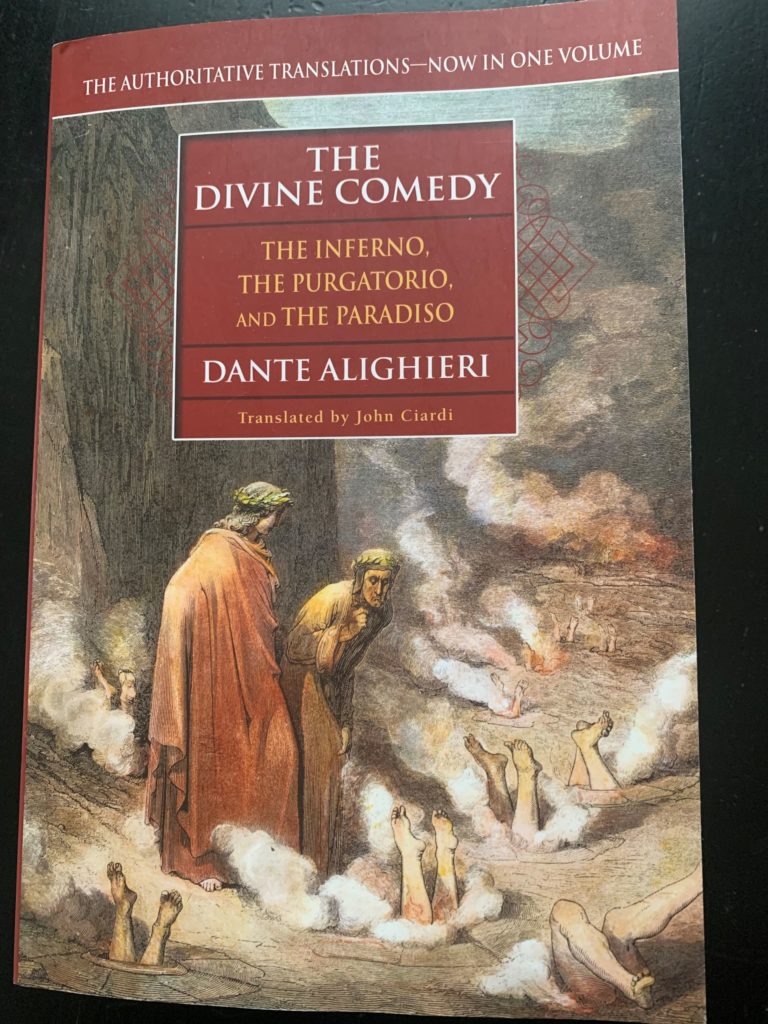Now I have gone a done it. I picked something so ambitious that I don’t know where to start. In case you are not familiar, The Devine Comedy was written in the late 1200s, set in 1300. Of course, it was written in Italian which means it was translated into English for me. Because of it’s age, it has been looked at over and over again and so there is lots of opinions about what it says and what it means.
I have read part 1 (The Inferno) before. All three of these are poems which contain much symbology making it not only abstract but also highly subjective to the translators vision. I find myself reading and re-reading because I don’t know what is exactly happening. My version is huge, it seems like half of it are notes as to what this or that is referring to or why they chose this translation versus others.
My purpose for picking this book was to spend more time talking about eternity and Devine topics more critically. For instance, I don’t particularly believe Purgatory, it will be interesting to see what Dante has to say about it. So far, I can already tell that it is helpful to have a good command of Roman history, mythology and Christianity because there is a lot here that I am referring to the notes to keep up.
This book is going to take a while. I plan on breaking it up into one topic at a time. Canto I and II are considered introductions to the levels of hell. So, when I get to the first level, that will be a week unto its own. I don’t know the book well enough to say what each week will be yet, but maybe I can do it as I go along. That being said, feel free to read ahead.

Because things are so cryptic, I am going to look at other sources while we go along. Normally, I don’t like doing that because I feel that it influences my opinion. But, in this case, it is necessary otherwise I won’t get anything out of this. If I don’t get anything, it will be pretty difficult to give anything worthwhile.
With that, Canto I and II are considered the introduction to the Inferno. Canto I has Dante entering the afterlife met by Virgil, the Roman poet. It has been speculated that Virgil is at the beginning of the journey because he lived pre-Christ. Therefore in the Catholic belief, he could not attain pure heaven nor hell. Virgil will be guiding Dante through Hell and some of Purgatory.
Canto II, Virgil explains that he was instructed by Beatrice to deliver three prayers to Dante because of concern for his love life. In case you don’t know who Beatrice is, she is the love of Dante’s life but married to another so he can’t have her. I had to look her up too, confused yet? Because of Dante, she was a semi-famous subject for nineteenth century art, but more of an inspiration to the story.
Virgil sort of lays out the land of how things are going to go including getting past the leopard of malice and fraud, the lion of violence and ambition and the she-wolf of incontinence. Now we have some foreshadowing for the hierarchical levels of hell too. If you thought like I did, hmm the worst sin is to poop all over the place. I had to think about that wording a little stronger. Actually the first definition in Webster is a the state of being incontinent. And the definition of incontinent contains 1) lacking self-restraint 2) not being under control.
We might imagine all types of sin that fall into that category. In broad strokes or my interpretation is non-violent crime, followed by violent crime and then sadistic, evil acts. All that is of course subject to the lens of the period. We will wait and see what this actually translates to in the book.
My book offers a summary before each Canto. In the summary, it claims that Dante and Virgil are symbols for human reason while Beatrice is the representing Devine love. It also talks about the levels being recognition of sin for hell, the reunification of sin for purgatory and then finally heaven. Even though I don’t hold those Catholic beliefs, I can sort of see the value of clearing them out of your existence before heaven. It is like the twelve step program, you have to attempt to make amends before you can be free yourself.
Let me cut to the chase here. If we believe everything about the symbols, then this is God telling Dante to figure it out. Use your human brain to understand eternity and I will use the most attractive bait I can find to persuade you. And so, we begin The Devine Comedy by Dante Alighieri.
End Your Programming Routine: This was and will be hard. With the advent of modified beliefs and 750 years, we will see if we can learn the same lessons that Dante did. I do not believe that humanity or behavior has changed significantly since that time but our interpretation or judgement may have. Next week will be Canto III and IV,
Recent Comments